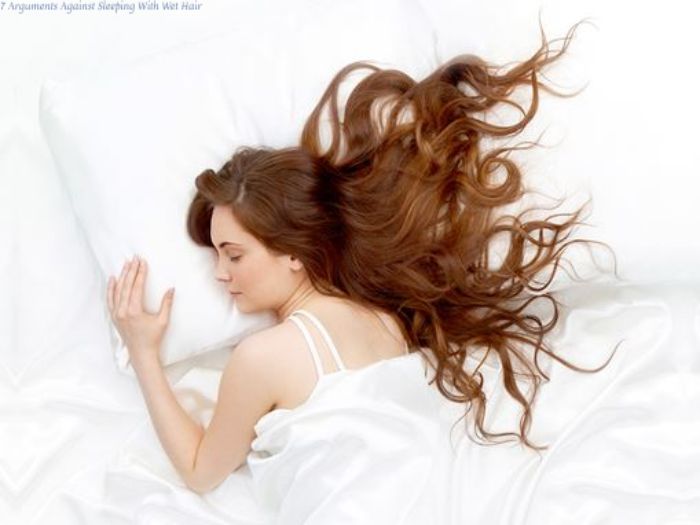If you’ve heard the proverb that one should never eat before swimming, you’ve undoubtedly also heard that sleeping with wet hair will make one feel unwell.
You’ve probably disregarded this warning despite the lack of supporting information or an explanation, but may you be endangering yourself?
You will learn about seven scientific arguments against sleeping with damp hair on this page. Let’s start.
It may result in significant hair loss.
Your hair may become damaged and break if you sleep with damp hair. Sleeping on wet hair can cause it to break and split since it is more delicate than dried hair. This is especially true if you snore or wake up frequently during sleep. Sleeping with damp hair might eventually lead to damage that is hard to fix.
Infection of the scalp will result.
Scalp infections can also result from sleeping with damp hair. A moist environment is created by damp hair to grow germs and fungi. Dandruff, scalp acne, and other infections may result from this. These infections can be challenging to cure and permanently harm your scalp and hair.
You may get a chill.
Additionally, sleeping with damp hair might make you feel chilly. Your body temperature might drop when your hair is damp, making you feel colder than you are. This may make it difficult to fall asleep at night and to wake up in the morning.
You must invest more effort in styling your hair.
Your hairdo might be ruined if you go to bed with damp hair. If you go to bed with damp hair, your hair may get frizzy and tangled. Your hair may be challenging to style the next day as a result. It might also be frustrating to find it challenging to get the desired look.
Reduce hair growth
Some hair experts claim that sleeping with damp hair might also inhibit new hair growth. It may take longer for wet hair to dry and is more likely to break. This may result in hair that is weaker and breaks more frequently. If you’re attempting to grow your hair out, this may eventually cause the pace of hair development to slow down, which can be upsetting.
It could result in hair loss.
Going to bed with damp hair can cause ringworm on the scalp and, more precisely, hair loss. Scalp ringworm is a fungal illness brought on by warm, humid weather.
It may cause headaches for you.
According to a select few hair care experts, sleeping with damp hair decreases body temperature, which results in headaches as the body tries to raise its temperature. According to some experts, wrapping your hair in a towel before bed causes discomfort and could even make you have trouble sleeping.
What should you do in its place?
An individual can attempt the strategies listed below to reduce the chance of damage or issues from sleeping with damp hair.
-
Lessen your nightly hair washing.
It depends on personal taste how often people wash their mane in a given week.
According to a study, washing your hair every day without experiencing any problems is okay. Frequent and everyday washing with a strong, chemical-free shampoo won’t harm the hair.
-
Give yourself more time between washing and going to bed.
Consider beginning your evening routine early, which should include washing your hair. This will help them have dryer hair when it’s time for bed. This will lessen the possibility that it will be moist and provide a favorable environment for fungus growth.
-
To stop breakage, use conditioner.
You can use conditioner or a two-in-one conditioner (sometimes called a 2-in-1 shampoo) every time you wash your hair to maintain it healthy and lower the chance of damage. The silicone component of the conditioner replenishes sebum oil after shampooing, leaving the hair lustrous and silky.
-
Use coconut oil or organ oil to moisturize hair.
This oil may moisturize hair because it penetrates the outer cells.
According to research, coconut oil helps stop damaged hair from losing protein. Argan oil also aids in moisturizing hair.
In summary,
There are several benefits to not sleeping with damp hair. Although it could only be a slight nuisance, it will cause several health issues. It is recommended to dry your hair before night to prevent them.
It is advised to speak with the best hair transplant doctor, who has considerable expertise in hair transplant therapy and a proven track record of good outcomes if you are experiencing hair loss concerns and considering hair transplant surgery. You may look into the doctor’s qualifications, board certifications, and patient testimonials.
Also read:-Does Wearing Your Hair Up Actually Push Your Hairline Back?
